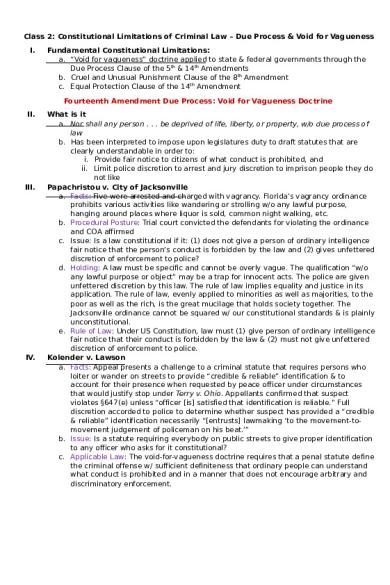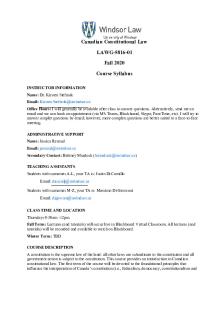Constitutional Limitations of Criminal Law – Due Process & Void for Vagueness PDF

| Title | Constitutional Limitations of Criminal Law – Due Process & Void for Vagueness |
|---|---|
| Course | Criminal Law |
| Institution | Campbell University |
| Pages | 3 |
| File Size | 74.9 KB |
| File Type | |
| Total Downloads | 113 |
| Total Views | 142 |
Summary
Due Process & Void for Vagueness...
Description
Class 2: Constitutional Limitations of Criminal Law – Due Process & Void for Vagueness I.
Fundamental Constitutional Limitations: a. “Void for vagueness” doctrine applied to state & federal governments through the Due Process Clause of the 5th & 14th Amendments b. Cruel and Unusual Punishment Clause of the 8th Amendment c. Equal Protection Clause of the 14th Amendment Fourteenth Amendment Due Process: Void for Vagueness Doctrine
II.
III.
IV.
What is it a. Nor shall any person . . . be deprived of life, liberty, or property, w/o due process of law b. Has been interpreted to impose upon legislatures duty to draft statutes that are clearly understandable in order to: i. Provide fair notice to citizens of what conduct is prohibited, and ii. Limit police discretion to arrest and jury discretion to imprison people they do not like Papachristou v. City of Jacksonville a. Facts: Five were arrested and charged with vagrancy. Florida’s vagrancy ordinance prohibits various activities like wandering or strolling w/o any lawful purpose, hanging around places where liquor is sold, common night walking, etc. b. Procedural Posture: Trial court convicted the defendants for violating the ordinance and COA affirmed c. Issue: Is a law constitutional if it: (1) does not give a person of ordinary intelligence fair notice that the person’s conduct is forbidden by the law and (2) gives unfettered discretion of enforcement to police? d. Holding: A law must be specific and cannot be overly vague. The qualification “w/o any lawful purpose or object” may be a trap for innocent acts. The police are given unfettered discretion by this law. The rule of law implies equality and justice in its application. The rule of law, evenly applied to minorities as well as majorities, to the poor as well as the rich, is the great mucilage that holds society together. The Jacksonville ordinance cannot be squared w/ our constitutional standards & is plainly unconstitutional. e. Rule of Law: Under US Constitution, law must (1) give person of ordinary intelligence fair notice that their conduct is forbidden by the law & (2) must not give unfettered discretion of enforcement to police. Kolender v. Lawson a. Facts: Appeal presents a challenge to a criminal statute that requires persons who loiter or wander on streets to provide “credible & reliable” identification & to account for their presence when requested by peace officer under circumstances that would justify stop under Terry v. Ohio. Appellants confirmed that suspect violates §647(e) unless “officer [is] satisfied that identification is reliable.” Full discretion accorded to police to determine whether suspect has provided a “credible & reliable” identification necessarily “[entrusts] lawmaking ‘to the movement-tomovement judgement of policeman on his beat.’” b. Issue: Is a statute requiring everybody on public streets to give proper identification to any officer who asks for it constitutional? c. Applicable Law: The void-for-vagueness doctrine requires that a penal statute define the criminal offense w/ sufficient definiteness that ordinary people can understand what conduct is prohibited and in a manner that does not encourage arbitrary and discriminatory enforcement.
d. Holding: We conclude that the statute as it has been construed is unconstitutionally vague w/in the meaning of the Due Process Clause of the 14th Amendment by failing to clarify what is contemplated by the requirement that a suspect provide a “credible & reliable” identification. §647(e) is unconstitutionally vague on its face b/c it encourages arbitrary enforcement by failing to describe what a suspect must do in order to satisfy the statute. COA Affirmed e. Rule of Law: A criminal statute is constitutional only if it can be fairly enforced & if it gives the individual fair & adequate notice of the type of conduct prohibited by the statute.
V.
VI.
Masculinities, Post-Racialism, & the Gates Controversy: The False Equivalence Between Officer & Civilian a. Crowley’s Report: Crowley was made aware of a possible break-in in Square area. According to Crowley, the caller stated that what she observed appeared to be two black males with backpacks on the porch. Crowley arrived at the house and asked Gates to come outside. He then asked for a photo ID, which Gates initially refused but then later provided. Gates was allegedly being loud, and Crowley warned Gates that he was becoming disorderly. Crowley arrested Gates for disorderly conduct. b. Gates’s View: Gates claimed that he asked one of Crowley’s fellow officers for Crowley’s name and badge number, thereafter, Crowley handcuffed him. He claims he never explicitly called Crowley a racist and says he could not have been particularly loud because he was recovering from a bronchial infection. Sessions v. Dimaya a. Facts: Dimaya was a native of the Philippines and a lawful resident of the US. Following his second conviction of first-degree burglary, the government initiated a removal proceeding against him. Both an immigration judge and an appeals board held that first-degree burglary was a crime of violence under 18 USC §16(b). While Dimaya’s appeal was pending, SCOTUS held in Jonson v. US that the definition of “violent felony” in another fed law was unconstitutionally vague. The relevant section of that law was worded similarly to the law applied here. Relying on Johnson, the court of appeals ruled that §16(b) was unconstitutionally vague. The appeals ct thus ruled in Dimaya’s favor. The government appealed arguing that b/c this was not a criminal case, the void-for-vagueness doctrine should not be applied as rigorously. b. Issue: Does the void-for-vagueness doctrine prohibit laws that require courts to identify the type of conduct the ordinary case of a crime involves and to judge whether that abstraction presents and unspecified degree of risk? c. Holding: The void-for-vagueness doctrine prohibits laws that require courts to identify the type of conduct the ordinary case of a crime involves and to judge whether that abstraction presents and unspecified degree of risk. Courts must ask whether the ordinary case of an offense possesses the requisite risk. Section 16’s residual clause violates that promise in just the same way. §16(b) also calls for a court to identify a crime’s “ordinary case” in order to measure the crime’s risk. Nothing in §16(b) helps courts to perform that task, just as nothing in ACCA did. It also possesses another fatal feature: uncertainty about the level of risk that makes a crime “violent.” In ACCA, that threshold was “serious potential risk”; and here it is “substantial risk.” d. Concurring (Gorsuch): Congress has the ability to fix the residual clause by adding more specific crimes, rather than asking the court to come up with a list of crimes covered by the clause. Congress also could add fair notice to the clause by stating
that a conviction for any felony carrying a particular prison sentence subjects an alien to removal....
Similar Free PDFs

Criminal Due Process - Chapter 1
- 1 Pages

Constitutional Law notes for exam
- 141 Pages

Fundamentals of Criminal Law
- 24 Pages

Constitutional Law
- 5 Pages

Criminal Law
- 77 Pages

Limitations of Internal Control
- 5 Pages

Constitutional law syllabus
- 13 Pages
Popular Institutions
- Tinajero National High School - Annex
- Politeknik Caltex Riau
- Yokohama City University
- SGT University
- University of Al-Qadisiyah
- Divine Word College of Vigan
- Techniek College Rotterdam
- Universidade de Santiago
- Universiti Teknologi MARA Cawangan Johor Kampus Pasir Gudang
- Poltekkes Kemenkes Yogyakarta
- Baguio City National High School
- Colegio san marcos
- preparatoria uno
- Centro de Bachillerato Tecnológico Industrial y de Servicios No. 107
- Dalian Maritime University
- Quang Trung Secondary School
- Colegio Tecnológico en Informática
- Corporación Regional de Educación Superior
- Grupo CEDVA
- Dar Al Uloom University
- Centro de Estudios Preuniversitarios de la Universidad Nacional de Ingeniería
- 上智大学
- Aakash International School, Nuna Majara
- San Felipe Neri Catholic School
- Kang Chiao International School - New Taipei City
- Misamis Occidental National High School
- Institución Educativa Escuela Normal Juan Ladrilleros
- Kolehiyo ng Pantukan
- Batanes State College
- Instituto Continental
- Sekolah Menengah Kejuruan Kesehatan Kaltara (Tarakan)
- Colegio de La Inmaculada Concepcion - Cebu








